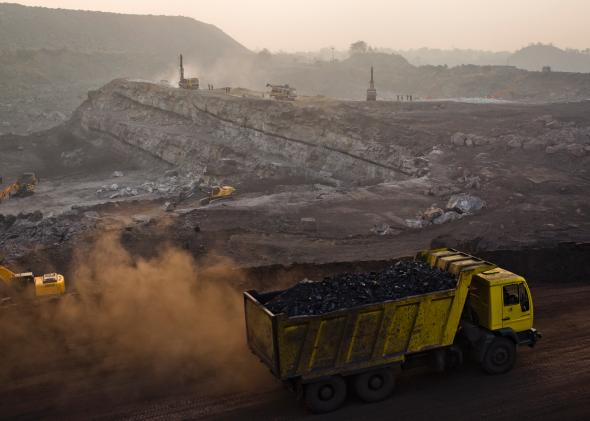The "War on Coal," A Political Dead End

Photo by Daniel Berehulak /Getty Images
Over the weekend, the Washington Post's Lori Montgomery (temporarily freed from the soul-killing budget beat) published a gripping ground-level study of climate change fears in Virginia's tidewater region. As you might guess from the name, tidewater—which swung to the Obama ticket in 2008 and 2012—is bracing for rising sea levels.
The city hired a Dutch consulting firm to develop an action plan, finalized in 2012, that called for new flood gates, higher roads and a retooled storm water system. Implementing the plan would cost more than $1 billion—the size of the city’s entire annual budget—and protect Norfolk from about a foot of additional water.
As the city was contemplating that enormous price tag, the Virginia Institute of Marine Science (VIMS) last year delivered more bad news: If current trends hold, VIMS scientists said, by the end of this century, the sea in Norfolk would rise by 51 / 2 feet or more. “Clearly, we’ve got more work to do,” said Ron Williams Jr., Norfolk’s assistant city manager for planning.
Ed Gillespie, the avuncular but probably doomed Republican candidate for Senate (he currently trails Sen. Mark Warner by 19 points) has not yet said anything about that article. But he's been tweeting up a storm about proposed EPA regulations, finalized today, that will mandate greenhouse gas emissions falling 30 percent below 2005 levels by 2030.
Virginia's coal country can't afford these harmful EPA regs - experts say coal country will be 'decimated'
— Ed Gillespie (@EdWGillespie) May 28, 2014VA needs a senator who will stand up for our coal miners, their families & the businesses that rely on them
— Ed Gillespie (@EdWGillespie) May 28, 2014Here's a quick video update from the campaign trail in Dickenson County earlier today. http://t.co/7CDrPDq7JN
— Ed Gillespie (@EdWGillespie) May 29, 2014in South Atlantic region proposed EPA regs would mean an estimated 59,700 lost jobs annually through 2030 http://t.co/2Xs9n5fOdR #EPA
— Ed Gillespie (@EdWGillespie) June 2, 2014From a pure horse race respective, it's a strange decision by Gillespie. "Coal country," as it's defined in Virginia, swung hard away from Democrats from the 1990s to today. In 2012, Mitt Romney won Dickenson County by 24 points. The catch is that Dickenson County voters cast fewer than 7000 ballots.
Obama won the city of Norfolk by 44 points. It cast nearly 77,000 votes.
Of the many ways to look at the EPA regulations, "bad for the Democrats" has got to be the strangest. It's very easy to find coal country voters turning on their historic party, and easy to find Republicans bashing the rules. It's easier to find polling in which voters support them. In a Pew survey, 65 percent of all Americans and 52 percent of Republicans support tighter emissions standards. They do so, in part, because energy prices have not risen measurably. Gasoline prices have remained close to 2009 levels after a fall-off during the 2008 economic crisis. (Another dumb Republican line that makes sense to their base and to no one else: Gas was less than $2 on inauguration day! Yes, because of a collapse in demand, which no one has nostalgia for.)
That frees up voters to care about the effects of energy use, and not just its costs. Sure, this would not be the case had Democrats succeeded in 2009 and passed carbon taxes. But they didn't. It would be a bigger political problem if the energy industry wasn't, as usual, responding to regulation by looking at more ways to capture carbon. But it is. The Obama administration, having won the megastates of coal country (Ohio, Pennsylvania, Virginia) twice now, is making life marginally more difficult for coal-country candidates. They're already distancing themselves from the rule. In the rest of the country, the rules are hardly controversial, and the sloppy Chamber of Commerce research that suggests EPA rules will kill jobs never seem to convince the millions of people whose jobs depend on, you know, the water levels not rising five-and-a-half feet.
